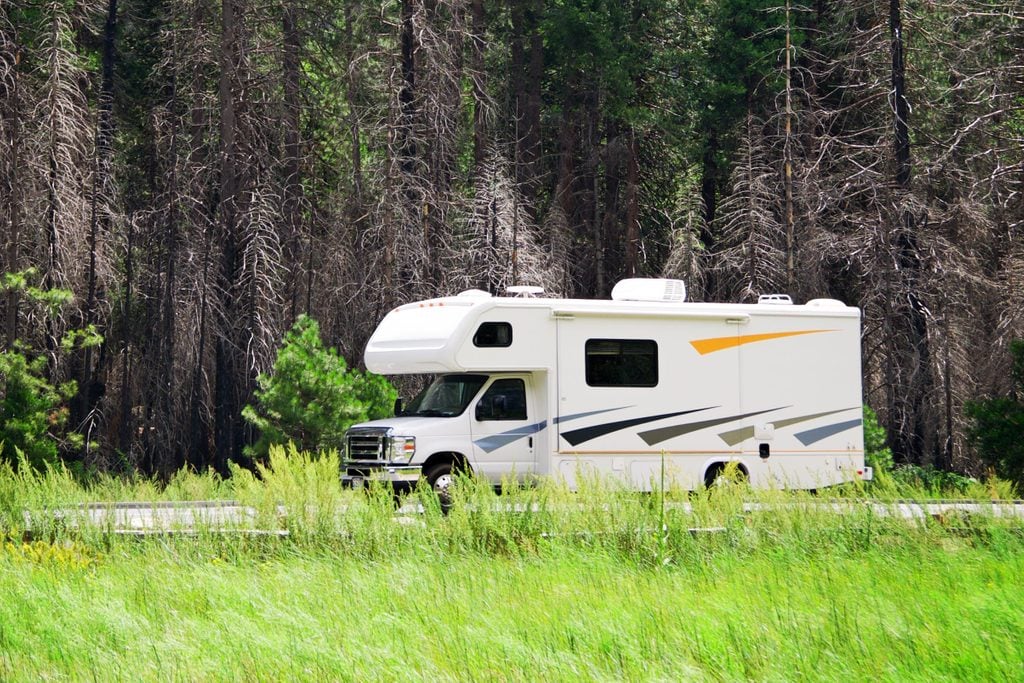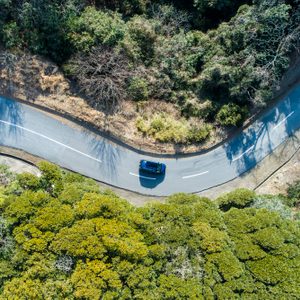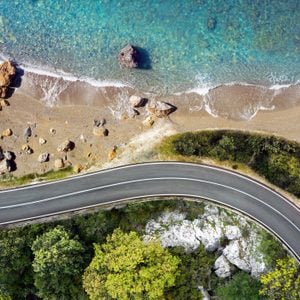Where to Park Your RV for Free on a Road Trip
Updated: Apr. 30, 2021

On a tight budget? Find out how to score free overnight parking anywhere in the country and save a bundle on your next vacation.
Ready to take one of the best road trips in America and see the country from the comfort of your RV? Whether you’re an experienced RV enthusiast or you’re heading out for the first time, you’ll need to find somewhere to park. While choosing to stay at one of the best RV parks in the United States is definitely a good option, sometimes you might want to avoid the crowds—and the fees that RV parks charge. In that case, you’ll want to check out the spots that offer free overnight parking. Here’s what you need to know for the ultimate budget-friendly road trip, whether you’re looking for a quick overnight stay or a longer-term arrangement.
Where to find free RV parking
Whether you plan to park overnight in an RV park or in a national forest, you’ll want to do some research ahead of time, as well as download a few apps to use during your trip. You can also use an American road trip guide to help you plan your trip (including how to calculate your road trip cost). Lands managed by the U.S. Forest Service and by the Bureau of Land Management (BLM) are “multiple use” sites, so they’re dedicated to preservation but also allow for recreational activity. These sites are your best bet for finding free overnight parking for your RV. Most of them are also dog-friendly.
The RVParky app, Allstays app, and Campendium website have exhaustive lists that include overnight RV parking and camping options across the United States and Canada. Search by location and price (filtering by “free,” if you’d like) to find RV parking options in parks, forests, parking lots, and public lands. You might also want to check out these top spots for beach camping.
What to know before starting your RV road trip
Many towns and cities prohibit long-term parking on public streets, so even if you’ll be parking your RV or travel trailer in front of a friend’s home, you’ll need to abide by public ordinances. Off-grid camping is typically allowed anywhere on federal public lands within a specified distance of established roads, except where it’s otherwise restricted. Check with local authorities or online to see the varying rules for each location you want to visit.
Some of the most popular RV parks and campsites fill up quickly during warm-weather months, with some booking up months in advance. If you’re committed to parking only where there isn’t a fee, understand that there will be fewer options and there likely won’t be electric or water hookups. No matter what your plan is, always have a backup plan, just in case the RV park or campsite you had in mind is at capacity. Under no circumstances should you set up in an area that doesn’t allow it. Not only could illegal parking and camping damage the ecosystem and threaten wildlife, but it’s also illegal. The same rules apply if you’re leaving your RV at home and doing some free camping instead.
Why avoid RV parks
Aside from not wanting to pay a fee, there are other reasons you might want to stay somewhere other than an RV park. They aren’t necessarily bad places to stay—they’re great for amenities and for meeting fellow travelers—but sometimes you may want to get off the grid. If you’re not concerned with having hookups for electricity and water, boondocking (camping without the hookups) can be a great way to avoid the crowds, noise, and light pollution associated with RV parks. Opting for a dispersed campsite (a site outside of a designated campground) also lets you reconnect with nature while saving some money on RV park fees. If you’ll be heading out on an extended RV adventure, you’ll likely need to stay in proper RV parks sooner or later, but if you just need a quick place to sleep, sacrificing amenities during short-term stays can add up to big long-term savings. Don’t miss these other ways to find cheap places to stay.
How much does it cost to stay in an RV park
According to Alyssa Padgett, author of A Beginner’s Guide to Living in an RV, the average price of an RV park is around $45 to $50 per night, but that price can vary dramatically. Depending on the season, location, size of your vehicle, amenities offered, and whether or not you’ll need electric and water hookups, you can expect to pay anywhere from $10 to $120 per night for 24-hour parking at an RV park. A large RV park that has tennis courts, playgrounds, showers, and dining facilities may cost three or four times as much as a park that only has electric and water hookups.
Where to look beyond campgrounds
If you’re looking for a non-campground experience, check out HipCamp, which is sort of like an Airbnb for campers, offering ranches, farms, beaches, and private land preserves (for a fee). Harvest Hosts is a paid membership program (about $100 per year) that allows members access to more than 1,500 RV-friendly breweries, wineries, vineyards, and museums. Whether you’re staying on a beach, a farm, or in a cidery, there are some great phone apps that help you plan your trip, determine where to go, and find the best restaurants and services nearby. These are the best road trip apps you can get for free.
Safe places to park an RV overnight
Though many full-time RVers swear by Cracker Barrel and Walmart parking lots as safe and secure overnight options, free overnight parking isn’t always guaranteed. Though Walmart has a longstanding RV-friendly parking policy, you’ll still want to call the store ahead of time to check with the manager. If you plan to rely on their stores during your trip, first check this list of no-go Walmarts, which is regularly updated based on the experiences of RVers who attempted to or successfully camped in their lots. Avoid large retail shopping center parking lots, as they tend to be patrolled, private property and you’ll be asked to leave.
Rest stops and truck stops also tend to be great options for overnight RV parking because they are well lit and have 24-hour bathrooms. Casinos fall into this category, too, and the grounds may be patrolled, but some casinos may also attract sketchy characters. Many outdoor stores like Bass Pro Shop, Cabela’s, and Camping World will also let you park your rig overnight, but it’s always best to check with the manager in advance.
How long you can park your RV for free
Each campsite, RV park, forest, and public space has its own rules about how long you can park there. Most Bureau of Land Management sites cap free camping at 30 days, though the amount of time can vary by location. Most national forests allow dispersed camping up to 14 days, but some areas are limited to one day, while others allow up to 30 days. Check the local regulations by stopping by the ranger station or calling ahead of your stay. For travel inspiration, check out the most scenic campsites in every state.
How to be a responsible RV camper
The most important Leave No Trace principle is properly planning ahead. Knowing exactly where you’ll camp, having backup plans for alternate campsites, and bringing all the supplies you’ll need will go a long way.
Proper waste disposal is essential, and while RV parks may have waste disposal options, dispersed campsites won’t, so you’ll need to keep all your waste with you until you’re able to safely dispose of it. This includes packing up all your food waste and garbage, as well as burying human waste in an eight-inch “cathole” that’s 150 feet from trails and water sources.
Vehicles can do significant damage to the environment, so it’s crucial that you look for already impacted sites with well-worn access drives. Never drive onto vegetation, cut down trees, or stray beyond the borders of established camp areas. If, and only if, you confirm campfires are allowed in an area, you can minimize your campfire impact by seeking out existing campfire rings instead of creating new ones. Buy local firewood (or gather firewood in the area, if it’s allowed) to prevent the spread of invasive species. Before you leave, make sure that the fire is completely out and that any food you may have thrown in the fire has completely burned up so wild animals aren’t attracted to it. While you’re at it, make sure to avoid these other common camping mistakes many first-timers make.



